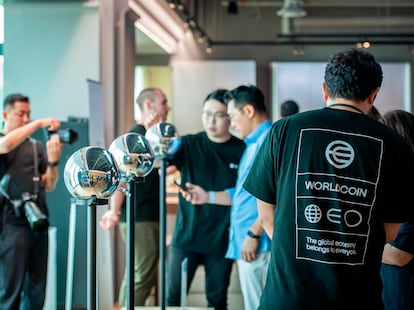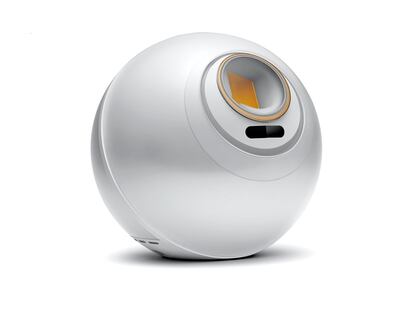Why Sam Altman wants to scan two billion eyes
The CEO of Open AI plans to create the largest biometric database in the world with another of his companies, which is registered in the Cayman Islands

Sam Altman – the executive behind ChatGPT – has scanned the irises of more than two million people with a metal sphere, to prove that they’re human.
The process is simple: you install an application on your mobile phone and receive a QR code. Then, you must allow a metallic sphere to look at you with its eye and generate a “personality test.” The proof is then associated with the QR code and the app becomes a passport called World ID. This also acts as a digital wallet for a cryptocurrency called Worldcoin.
Many shopping centers are already offering this service. But the question is: why would anyone want to submit this personal information?
The answer is money. Prior to the launch this past July 26, Sam Altman subcontracted hundreds of third-party “operators,” who charge per eye scan in countries across the Global South. In Indonesia, his company offered T-shirts, Airpods and vouchers for 25 Worldcoins that they valued at $55 (today, they are worth half as much) to get people to scan their eyes. Altman’s startup also organized cryptocurrency workshops in high schools to scan dozens of students… many of them minors.
The “money” is not yet redeemable and Worldcoin is unaware of any persistent technical failures, or of any operators having been arrested or assaulted for offering false incentives. Kenya has banned the company’s eye scans, as the nation’s data protection, security and financial service agencies all doubt the authenticity and legality of such activities. There is also widespread skepticism about user consent, as the data release terms have not been translated into local languages in several countries.
Altman claims that the digital passports and wallets will be essential when general artificial intelligence (AI) has surpassed ours and unemployed humans need to receive a universal income. “It’s unlikely that we will pay for it,” his European manager – Ricardo Macieira – recently clarified, “but we want to be the infrastructure that allows governments and entities to do so.”
The company that developed this for Altman is called Tools for Humanity. Worldcoin, meanwhile, operates as a registered foundation in the Cayman Islands, a tax haven. EL PAÍS has attempted to obtain the tax status of Tools for Humanity through various channels, without obtaining a response.
This philanthropic narrative is often deployed within capitalism. But for Sofie Henriksen – an anthropologist specializing in the intersection of humanitarian action and tech giants – this latest incarnation is special. “Technology companies are the first to openly use their philanthropic projects to test new technologies, expand the numbers of users and share or extract personal data to train algorithms,” she explains via email. “They’re all competing to collect as much data as possible.” Tech companies are descending on developing countries with services, applications and infrastructure, much of which is deployed without people’s consent. There’s a new academic term for this: digital colonialism.
Biometric data is especially sensitive, because it’s immutable; we cannot change our iris in the same way we can change our name or address. This results in greater potential for abuse, because people can be remotely identified without their consent. They can hence be associated with discriminatory parameters, as demonstrated by the automatic identification system applied to the Uyghurs, implemented by Huawei for the Chinese government. There are two precedents behind Worldcoin: one is humanitarian, while the other is governmental.
The capture of biometric data has become common in contexts of migration, where iris-scanning is a precondition to receiving humanitarian aid. In 2019, the United Nations World Food Program partnered with the firm Palantir to optimize these operations, which today affect 160 million people in 120 countries. Worldcoin has adopted a rhetoric that’s similar to what these organizations use: “In both cases, iris-scanning is presented as a tool that will ensure a fair distribution of resources, be it cryptocurrency or aid and food,” Henriksen notes. Refugees and poor communities – where Worldcoin has collected the bulk of user profiles – have little control over consent and are vulnerable to exploitation.

Another controversial case is Aadhaar: the biometric database of the Indian government. The Modi administration has codified the registration of fingerprints and irises of one billion Indian citizens as an essential citizen participation tool to receive government pensions, scholarships, or access to aid programs for fuel and food. Its critics denounce it as the mass surveillance system, deployed by a totalitarian government in the process of radicalization.
There are 160 countries that systematically register biometric data… but a supranational database in the hands of a private company is much more dangerous. “We’ve seen the United Nations share their biometric registration of Rohingya refugees with the Myanmar government without their consent. A private company that subcontracts services in other countries makes accountability very difficult when there are rights violations,” argues Henriksen.
Tools for Humanity offers its technology to any organization or government that helps it accelerate its expansion in Europe, Latin America and Africa. Worldcoin says that privacy is guaranteed, because the user doesn’t have to give their name when registering and their iris is stored as an abstract numerical code. “Even if this were true – and we have no way of knowing if it is – the sphere could end up in the wrong hands,” says Anna Bacciarelli, chief technology officer at Human Rights Watch.
There’s another problem. The consent form (that nobody reads) says that the spheres also take high-resolution images of the user’s face, eyes and body, in addition to recording vital signs, such as heart rate and breathing. The French and German data protection authorities see signs of infringement of the European General Data Protection Regulation (GDPR) and have jointly launched an investigation.
Worldcoin presents itself as having a decentralized and transparent infrastructure. At the moment, however, the firm is private, centralized and opaque. Altman has raised $240 million from Silicon Valley’s most notorious venture capital firms, including Andreessen Horowitz, Tiger Global, Khosla Ventures and Coinbase Ventures. “The strong funding for the project points to the huge business opportunity,” says Ella Jakubowska, a biometrics and human rights specialist at the European Digital Rights Association. There’s an obvious market for the identification of bots and synthetic users on digital service platforms. In that sense, Worldcoin seems like the antidote to Altman’s other project: OpenAI.
Altman’s purported goal is to get involved in democratic processes and bolster access to social programs around the world. However, Jakubowska finds his data-collection attempt to be sinister. “Making a barcode for every inhabitant of the planet isn’t humanitarian at all. Worldcoin is the antithesis of a community.”
Sign up for our weekly newsletter to get more English-language news coverage from EL PAÍS USA Edition
Tu suscripción se está usando en otro dispositivo
¿Quieres añadir otro usuario a tu suscripción?
Si continúas leyendo en este dispositivo, no se podrá leer en el otro.
FlechaTu suscripción se está usando en otro dispositivo y solo puedes acceder a EL PAÍS desde un dispositivo a la vez.
Si quieres compartir tu cuenta, cambia tu suscripción a la modalidad Premium, así podrás añadir otro usuario. Cada uno accederá con su propia cuenta de email, lo que os permitirá personalizar vuestra experiencia en EL PAÍS.
¿Tienes una suscripción de empresa? Accede aquí para contratar más cuentas.
En el caso de no saber quién está usando tu cuenta, te recomendamos cambiar tu contraseña aquí.
Si decides continuar compartiendo tu cuenta, este mensaje se mostrará en tu dispositivo y en el de la otra persona que está usando tu cuenta de forma indefinida, afectando a tu experiencia de lectura. Puedes consultar aquí los términos y condiciones de la suscripción digital.









































